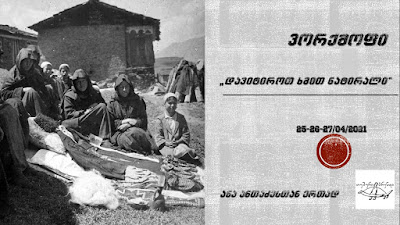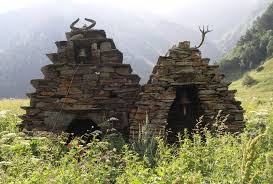Workshop with Children - Lamenting over the Loss of Ancient Lamentation Practices

Workshop
"Let's lament over Lament in Voice"/"დავიტიროთ ხმით ნატირალი"
25,26 & 27 April
I was invited in Alvani again! This time to create a workshop for the local youth. Here I talk about that remarkable three days.
Two weeks ago, in Alvani, Mari Khachidze from "Tusheti Brand"* invited me to visit again. This time to hold a workshop for the local children. The invitation was framed in the ongoing series of events she is creating, named "meetings with interesting people". The idea of these events is to give the children insights into interesting and exciting professions and occupations, so they have a variety of possibilities they can choose from later on. With my background in theater and performance, in conjunction with my current research subject "Lament in Voice", I wanted to explore with the young Alvanians "Lament in Voice" through self-reflective and interactional exercises, discussions and play.
"Lament in Voice" is part of the cultural heritage of Tushetian children (By further interest in Tushetian culture, see the post "Expedition to Kvemo Alvani - Meeting Tushetians",* link below.), yet that ancient practice is dying out. There are only bits and pieces of the lamenting rituals left over. That has the effect, that the children are either not aware of their tradition, or know it only somehow formally and distantly. Nevertheless, I consider the things they do know and do remember (through collective memory, through indirect cultural influence) as highly valuable. Those left-overs can be seen as traces, that lead to an encounter with "Lament in Voice".
I wanted to create a more subjective approach of getting in touch with the lamenting tradition. Not through learning about how it was done back in time and history. That has it's place. But as our generations are already somehow indifferent to it, I thought it would be better to first really understand what we already know about "Lament in Voice". And through that feel and sense our attitudes and relationships towards it.
As such the workshop was less about giving historical and anthropological knowledge on "Lament in Voice", but more about coming together in a group, in ritual setting, and coming to insights of our already existing attitude and relationship towards it, through experiential exercises and play. I find this an intriguing way to learn about "Lament in Voice". It was as if it introduced itself through these individuals, who are its cultural descendants.
Cultural goods continue their existence in individuals. That means, that we can understand those goods through the subjective findings of those individuals. Even when a given practice has become extinct, it still lays dormant in the collective memory. The main motive of this workshop was in this regard: To touch "Lament in Voice" through the collective memory in which it resides.
Creating the program for the workshop was exciting! I tried to touch these themes through game and play. And whilst doing that I would try to imagine the children in it. Wondering: What will come out when we enact this? What will emerge? Many of the exercises involved conceiving "Lament in voice" as a being in itself. Curious how the children would perceive it to sound, look, smell.
And this became the outline of the three days program:
Day 1. "Who is Lament in Voice for you?"
Day 2. "Get to know your voice" & "Personal meeting with Lament in Voice in a meditative state"
Day 3. "Associating objects with Lament in Voice" & "Setting up a "Plasi"* for Lament in Voice"
The idea was to get to know "Lament in Voice" each day through a different approach. The first day was more a talkative one, where we talked about "Lament in Voice". We talked about our personal experiences, attitudes and thoughts connected with it. On the second day the emphasis was more on experiencing our voices and connecting with "Lament in Voice" in a relational and personal way. On the third day we explored our relationship with "Lament in Voice" through objects.
We ended the workshop with a ritual, where we set up a "Plasi"* (Find the definition for "Plasi" below) for "Lament in Voice".
Here are small reports of the workshop (translated in English), that we put each day on the Facebook page of "Tusheti Brand", with some pictures:
Day 1. The first day of the meeting took place at the vocational school "Aisi". The workshop included active conversations about personal experiences and attitudes towards "Lament in Voice" through game and play. We did writing exercises about fictional and real encounters with the practice of "Lament in Voice". Also materials of "Lament in Voice" performances were screened and we shared what effects they had on us emotionally and somatically.
Little creations from our writing exercise
Day 2. Todays workshop was held on the main stage of the "House of Culture" and in the "Youth Center" of Alvani. In the theater space of "The House of Culture"- the interrelationship of body and sound was tested both, individually and in the group frame. We explored our voices in different settings and conditions of movement, pose, place and light. In the "Youth Center"- it was attempted to conceive "Lament in Voice" as a figure and meet it as a "person" in a meditative state, relationally and personally.
Day 3. "Lament in Voice" was imagined as a character, for which the participants chose objects with their own subjective associations connected to it. The objects were placed in designated places of their choice. The picking of the object and the placement were explained and shared. In this way a "Plasi" was set for "Lament in Voice". A critical part of the process was to share and try to explain the personal choosings, to become more aware about the personal relationship with "Lament in Voice". This allowed to get a clearer understanding of the connection between their personal relationship and the cultural tradition of "Lament in Voice".
Those were some rich three days. The children were amazing with their deep thoughts and interesting perspectives. We created a humming that was evoked after the second day's meditation, in which each of us met "Lament in Voice" personally. The weather and nature powers boosted our surroundings magically with thunder and rain.
Here is our humming, that was inspired from a personal meeting with the character "Lament in Voice":
After the opulent and pleasantly tiring working days I would dine with Mari Khachidzes family, where I was invited to stay throughout the visit.
Thanks for this experience.
And thanks for reading!
*By further interest for the organization "Tusheti Brand" visit: https://www.facebook.com/tushuribrendi
* Expedition to Kvemo Alvani - Meeting Tushetians"- https://georgianlamentation.blogspot.com/2021/04/expedition-to-kvemo-alvani-meeting.html
* "Plasi" - In Tusheti "Plasi" is called a designated "bed" for the deceased, that is set up with clothing and personal objects of the deceased. The "Plasi" is kept one year long. Exactly one year after the death of the person (Georgians call this day "head of the year"/, that is a death anniversary), the "Plasi" is brought out again, in the public, with all its clothes and objects of the dead. Relatives and friends cry and lament over the dead person. Also "lamentors in voice" would sing/ lament here. Then the men would sing "Dala" (Dala- is a Tushetian Lament, that is sung in choir, only by men. "Dala" has a certain text, that is kept always strictly. Only the name of the deceased changes.) After the "Dala" is sung they'd feast. It is believed, that after one year, the deceased has finally crossed to the yonder lands and joined the ancestors for good, if nothing went wrong.
* "Dala" - is a Tushetian Lament, that is sung at the deceased persons death anniversary, in a choir, by men. "Dala" has a strict text. Only the name of the deceased changes in the sung text.











Comments
Post a Comment